NOUNS
NOUNS
Traditional grammarians define a noun as "a person, place, thing, or idea."
Child designates a person; therefore, child is a noun.
Similarly, democracy designates an idea; therefore, democracy is a noun.
In addition, nouns can be identified by the presence of signal words such as the.

Word order can also provide clues about nouns. For example, in the following sentence, it is clear that the part of speech that will fit into slot #1 and slot #2 must be nouns:

Often, suffixes will suggest that a word is a noun. For example, -tion, -ness, -ment, or -er at the end of a word usually signify that the word is a noun, as in suggestion, happiness,involvement, and diner.
Nouns may be made plural, usually with the suffix -s or -es, as in books and foxes.
Nouns show ownership with the addition of an apostrophe and, sometimes, an additional -s, as in a book's pages, twenty students' essays.
Common nouns such as school, business, or person designate an entire class.
Proper nouns, on the other hand, designate a specific example of a class: Towson University, Black and Decker Company, Joe. Proper nouns are capitalized.
Nouns may be countable (1 fork, 2 forks, 3 forks, etc.) or non-countable (sugar, oil).
Nouns may signify concreteness (computer, fingernail) or abstractness (peace, friendship).
Functions of Nouns
Subject (S) - a noun or pronoun partnered with a predicate verb.
A subject
1. does an action with an action verb

2. exists with a verb of being
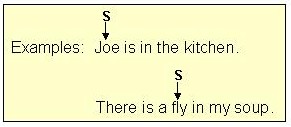
3. is renamed or described after a verb of being or a linking verb
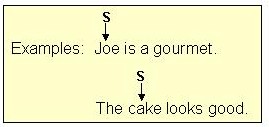
4. is acted upon with a passive verb

Object of Preposition (OP) - a noun or pronoun answering "whom" or "what" after a preposition in a a prepositional phrase.

Direct Object (DO) - a noun or pronoun answering "whom" or "what" after an action verb. A direct object "receives" or is the "object" of the action.

Retained Object (RO) - a noun or pronoun answering "whom" or "what" after a passive verb.

Indirect Object (IO) - a noun or pronoun answering "to whom/what" or "for whom/what" after an action verb.
An indirect object
- always precedes a direct object
- never has the word “to” or “for” stated
Subjective Complement (SC) - a noun, pronoun, or adjective that renames or describes (equals) the subject after a verb of being or a linking verb.
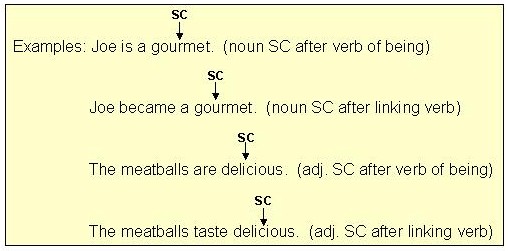
Objective Complement (OC) - a noun, pronoun, or adjective that renames or describes (equals) the direct object.
Test for OC: insert "to be" between the DO and the OC
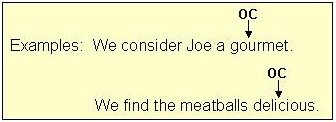
Appositive (App) - a noun or pronoun that renames another noun; An appositive is usually placed next to the noun it renames..

Gourmet renames the noun Joe. Therefore, gourmet is an appositive of Joe.
When an appositive is not placed next to the noun it renames, the appositive is called a delayed appositive.

A delayed appositive may rename the word it in some sentence constructions.
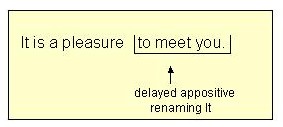
In the above sentence, the appositive to meet you renames it. It (to meet you) is a pleasure.
In this sentence, pleasure is the subjective complement of it.
Therefore, it = pleasure = to meet you.
There are six distinct groups of nouns.
1) Common Nouns
It is a word that speaks of something only in a general way like books, person. Common Nouns can be written in singular form or plural.
It is a word that speaks of something only in a general way like books, person. Common Nouns can be written in singular form or plural.
Common Nouns are not capitalised.
2) Proper Nouns
Proper Nouns name a very specific person, place or a thing. Proper Nouns always begin with a capital letter. For Example : Madam Curie, Steve Jobs, London.
Proper Nouns name a very specific person, place or a thing. Proper Nouns always begin with a capital letter. For Example : Madam Curie, Steve Jobs, London.
3) Concrete Nouns
Concrete Nouns is something that appeals to our senses. Any noun that we can experience or identify through one of our five senses (taste, touch, smell, see & hear)
For instance: Doughnut, Trees, Animals.
4) Abstract Nouns
On the contrary, Abstract Noun is a noun which cannot be identified by our five senses.
For Example: Intelligence, Stupidity, Anger
5) Collective Nouns
Collective Nouns are words used to name people, places and things in terms of Unit. They are naming words used for many animals, things, person and places taken together as units. For Instance: class, flock, herd & family etc.
6) Compound Nouns
New words can be formed by combining two or more words, thus creating a compound word.
For Example: Well-being, already

No comments:
Post a Comment